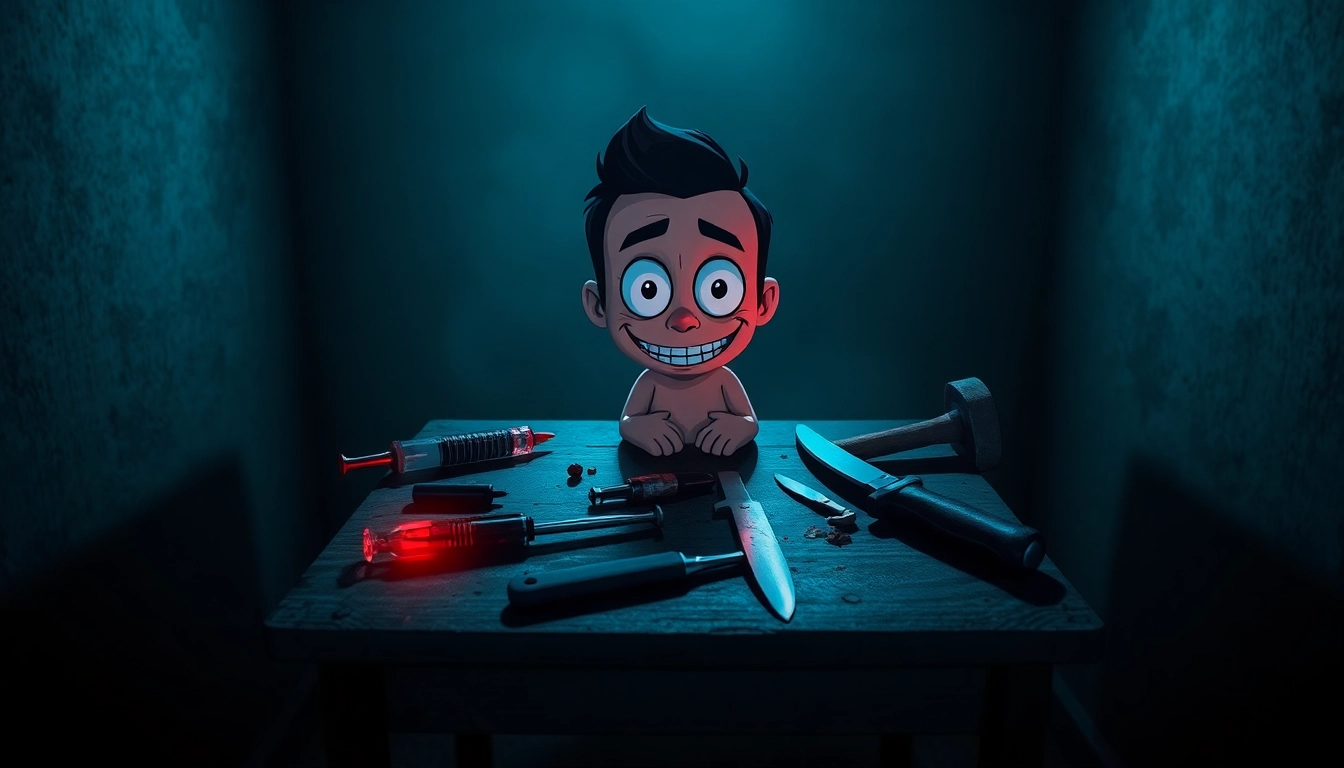Overview and Context: The Dark Allure of Blood Money
In the realm of psychological horror and morally challenging gaming experiences, blood money has carved out a unique niche. This dark clicker game immerses players in a disturbing narrative where every action, every click, pushes the protagonist further into a moral abyss. Unlike traditional games that focus on action or strategy, Blood Money challenges players to confront uncomfortable questions about human nature, survival, and the limits of morality. Its provocative design, combined with minimalist yet haunting visuals, makes it a compelling study of how gaming can serve as a mirror to our darker instincts. This article explores the intricate mechanics, narrative depth, psychological horror elements, and community insights surrounding Blood Money, offering a comprehensive understanding of why this game continues to resonate—and disturb—its audience.
Game Mechanics and Narrative Overview
Core Gameplay and Clicking Mechanics
At its core, Blood Money is a dark clicker game where the player assumes the role of someone desperately needing $25,000 for medical treatment. The gameplay revolves around clicking on Harvey, a cheerful and seemingly innocent character, to generate money. Each click increases the player’s funds but simultaneously causes Harvey pain and suffering. The game’s primary challenge is balancing the urgency of raising funds with the moral cost of inflicting pain. As players click, they can purchase upgrades from the shop, which include tools like needles, scissors, knives, and hammers. These upgrades significantly boost earning potential but come with increasingly disturbing visual and emotional consequences.
Upgrade System and Multiple Pathways
The upgrade system in Blood Money offers multiple pathways for players to customize their approach. Options range from minimally invasive tools, like needles and scissors, to violent instruments such as knives and hammers. Each upgrade not only increases the clicks’ profitability but also impacts Harvey’s appearance and reactions, subtly signaling the player’s moral choices. Interestingly, the game tracks how you play, subtly influencing the eventual ending. Players aiming for the ‘Good Ending’ tend to choose less violent upgrades, minimizing Harvey’s suffering. Conversely, those seeking maximum efficiency often select the most brutal tools, fully aware of Harvey’s increasing torment. This choice-driven mechanic creates a layered experience where moral decisions have tangible consequences.
The Dark Narrative of Blood Money and Harvey
Harvey: The Innocent Catalyst
Harvey’s cheerful demeanor initially appears as a harmless facilitator, encouraging the player to click and earn. However, as the game progresses, subtle clues suggest Harvey might be unaware of the true nature of the shop’s offerings. His surprise at more violent tools implies a naivety, adding complexity to the moral dilemma. Is Harvey merely a pawn, or does he represent innocence caught in a corrupt system? His reactions—ranging from cheerful to terrified—serve as visual cues for players, heightening the emotional impact of their choices.
The Shop: A Portal to Darkness
The in-game shop becomes a focal point for moral descent. Initially offering benign items like pillows for pillow fights, it gradually introduces tools that inflict pain and suffering. The escalation from harmless to violent reflects the player’s increasing moral compromise. Each purchase not only affects Harvey’s suffering and appearance but also pushes the narrative closer to its darker endings. The shop’s progression mirrors the player’s moral trajectory, making every decision a reflection of their willingness to cross ethical boundaries for survival.
Featured Gameplay Videos and Community Insights
Online gameplay videos reveal how players navigate the game’s moral landscape. Many express a visceral emotional response, especially when Harvey’s reactions grow more distressed. Community forums highlight discussions about strategies to achieve different endings, with some players intentionally testing the limits of violence to see how far they can go. Others focus on minimizing harm, exploring the emotional toll of their choices. These insights underscore the game’s ability to evoke genuine moral conflict, making it more than just a clicker game but a profound psychological experiment.
Confronting the Moral Dilemma
Time Pressure and Urgency
Time pressure is an integral aspect of Blood Money’s tension. The player is aware of the ticking clock—needing $25,000 quickly to pay medical bills—heightening the urgency and moral stakes. This pressure pushes players to consider whether they will prioritize speed and profit or moral integrity. The game’s pacing reinforces the visceral experience, making every decision feel consequential and immediate.
Multiple Endings: The Moral Outcomes
Blood Money culminates in three distinct endings, each a reflection of the player’s moral choices. The Good Ending involves minimal violence, where Harvey’s suffering is kept as low as possible, emphasizing compassion and restraint. The Normal Ending balances profit with moderate harm, representing a compromise. The Bad Ending maximizes violence and suffering, illustrating a complete moral descent. These endings serve as moral signposts, prompting players to reflect on their actions and the societal implications of greed versus compassion.
The Psychological Horror Elements Explained
Visual and Emotional Cues
Blood Money masterfully employs subtle visual cues—Harvey’s changing expressions, body language, and the increasingly grotesque visuals—to evoke discomfort. The game escalates from simple clicks to visceral scenes of pain and suffering, forcing players to confront their own morality. The emotional design taps into empathy and guilt, making the experience deeply unsettling.
Time Pressure and Psychological Stress
The ticking clock adds a layer of psychological stress, accentuating the moral dilemma. As time runs out, players feel compelled to make rapid decisions, often sacrificing their moral compass for quick profits. This intense pressure simulates real-life scenarios where survival instincts override ethical considerations, amplifying the horror experience.
The Duality of Innocence and Corruption
Harvey embodies innocence trying to help, yet the shop reveals darker forces at play. This duality creates a psychological tension—are we inherently good or evil? The game challenges players to reflect on their own morality, especially when faced with a situation where survival seems to justify immoral actions.
Community Reactions and Interpretations
The Blood Money community is vibrant, with players sharing strategies, emotional reactions, and moral reflections. Many discuss how the game’s design evokes genuine feelings of guilt or justification. Some players view Harvey as a symbol of innocence lost, while others see the game as a critique of societal greed. The community often debates whether the game’s ultimate message is about the corrupting influence of desperation or a deeper commentary on human nature.
Comparing Blood Money to Other Dark Clicker Games
While clicker games are typically lighthearted or purely strategic, Blood Money stands out for its dark narrative and moral complexity. Unlike conventional titles that focus solely on accumulating wealth or power, it forces players into ethical dilemmas, making every click a moral act. Its emotional depth and disturbing visuals set it apart from other dark-themed idle games, positioning it as a psychological horror experience disguised as a simple clicker.
Ethical Questions Raised by Blood Money
The Cost of Survival
The central question the game poses is: How far are you willing to go for survival? Is it acceptable to cause pain if it means saving your life? Blood Money doesn’t provide easy answers, instead prompting players to reflect on their own moral boundaries.
Violence and Morality in Gaming
The game also sparks debate about violence in video games. Is choosing violent upgrades justified by the need to reach a goal? Or does it reflect a darker side of human nature that games should challenge? Blood Money invites players to confront these uncomfortable truths, making it a powerful tool for moral introspection.
The Final Choice and the Ultimate Moral Test
As players reach their financial goal, they face a final moral decision—how much suffering are they willing to accept? The game culminates in a poignant moment where every choice made along the way influences the ending. Whether Harvey survives with minimal harm, suffers moderately, or is utterly devastated depends on the player’s moral pathway. This climax reinforces the core message: survival often comes at a moral cost, and the choices we make define our humanity.
About BLOODMONEY and Related Games
Blood Money is part of a broader genre of dark, morally complex games that challenge players to reflect on their values. While unique in its approach, it shares thematic similarities with titles that explore human depravity, survival ethics, and psychological horror. Its innovative use of simple mechanics to deliver profound moral questions makes it a standout in indie gaming circles.
Connect With Us
Interested in exploring more unsettling gaming experiences? Follow our updates for reviews, gameplay insights, and discussions about the dark corners of gaming. Share your own stories and moral reflections inspired by Blood Money—we’d love to hear about your journey through this disturbing yet thought-provoking world.
Conclusion: When Gaming Meets Moral Testing
Blood Money exemplifies how video games can transcend entertainment, becoming platforms for moral reflection and psychological exploration. By forcing players into a moral crucible, it questions the very nature of human depravity and resilience. Every click becomes a moral act, every decision a reflection of our own values and boundaries. As we navigate the dark, twisted corridors of this game, we are reminded that the true horror lies not in the visuals, but in the choices we make when faced with impossible situations. When gaming meets moral testing, the results can be profoundly unsettling—and enlightening. For those willing to confront their own morality, blood money offers a haunting, unforgettable journey into the darkest recesses of the human psyche.





